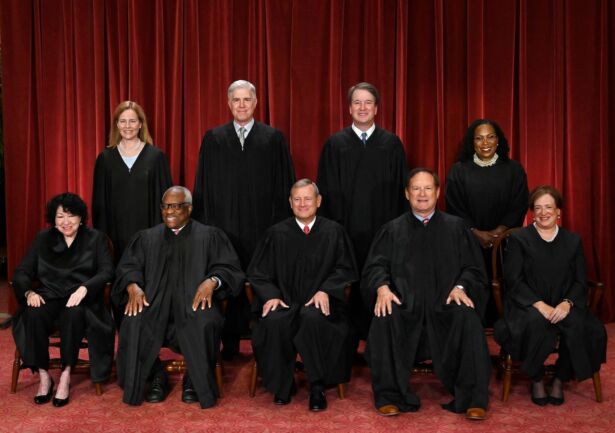The U.S. Supreme Court will rule on whether people under domestic violence restraining orders have the right to possess firearms, announcing Friday that it will hear a case on the matter during its next term.
The court on Friday agreed to review an appeal by President Joe Biden’s administration of a lower court’s ruling that found that the law ran afoul of the Second Amendment’s “right to keep and bear arms” because it fell outside “our nation’s historical tradition of firearm regulation.”
The case involves a Texas man, Zackey Rahimi, charged with illegal gun possession while subject to a domestic violence restraining order after assaulting his girlfriend. Rahimi challenged the law after being charged under it in 2021.
Rahimi, who had a history of dealing drugs including cocaine, knocked his girlfriend to the ground after an argument in a parking lot, dragged her to his car, shoved her inside, causing her to head to hit the dashboard, according to court papers. After realizing a bystander had seen his actions, according to the filing, Rahimi retrieved a gun and fired a shot.
Rahimi later threatened to shoot his girlfriend. She obtained a court-approved restraining order, but Rahimi was arrested for violating it, the papers said.
The filing said he was involved in five shootings in the Arlington, Texas area between December 2020 and January 2021. That included one in which he fired bullets using a rifle into the home of a person to whom he sold drugs. He was caught with a pistol and rifle during a police search of his home, the papers said.
The New Orleans-based 5th U.S. Circuit Court of Appeals in February declared that the 1994 was law unconstitutional in a ruling that applied to Texas, Louisiana, and Mississippi. The 5th Circuit initially had upheld the law but withdrew its opinion following the Supreme Court’s landmark Second Amendment ruling last year.
In June 2022, the U.S. Supreme Court ruled in the New York State Rifle and Pistol Association v. Bruen, with a majority finding (pdf) that a state law targeting who can carry concealed firearms in public ran afoul of the Second Amendment. Justice Clarence Thomas, writing for the majority, argued that all gun restrictions have to accord with gun laws during the founding of the United States.
Applying last year’s ruling, the 5th Circuit concluded that banning people under domestic violence restraining orders from owning firearms was “an outlier that our ancestors would never have accepted.”

The 1994 law at issue in the current case prohibited a person subject to a domestic violence restraining order from possessing a firearm. It initially made the crime punishable by up to 10 years in prison. It has since been raised to 15 years.
Lawyers for Rahimi urged the justices in court papers to let the appeals court opinion stand. “Bruen is less than a year old,” Rahimi’s lawyer J. Matthew Wright wrote, referring to the 2022 Supreme Court decision, adding that lower courts are only starting to make note of its impact.
Earlier this year, lawyers for the Biden administration asked the high court to overturn the appeals court decision, arguing that governments have “long disarmed” people who allegedly pose a threat to others’ safety. They argued that more Americans could become victims of domestic abuse if the ruling is allowed to stand.
“And if allowed to stand, it would thwart Congress’s considered judgment that persons who have been found to be a threat to their intimate partners or children should not be permitted to acquire or possess firearms,” the Department of Justice wrote. “The Fifth Circuit’s contrary decision misapplies this Court’s precedents, conflicts with the decisions of other courts of appeals, and threatens grave harms for victims of domestic violence,” the petition said (pdf).
Meanwhile, Attorney General Merrick Garland released a statement when the 5th Appeals Court rendered its ruling this year, saying that the 1994 law is constitutional.
“Whether analyzed through the lens of Supreme Court precedent, or of the text, history, and tradition of the Second Amendment, that statute is constitutional,” Garland said on the same day that the ruling was issued. “Accordingly, the Department will seek further review of the Fifth Circuit’s contrary decision.”
Pro-gun control groups also urged the court to keep the measure intact.
Douglas Letter, the chief legal officer of the Brady Campaign gun-control group, said that he believes the court will issue an order “correcting this terribly misguided ruling,” handed down by the 5th Appeals Court.
“Prohibiting domestic violence abusers from accessing firearms is common-sense, life-saving, and constitutional,” Letter said in a statement. “Firearms are the most common weapons used in domestic violence homicides, with female intimate partners more likely to be murdered with a gun than by all other means combined.”
The case is U.S. v. Rahimi, and it will be heard when the court’s next term starts in October. The Supreme Court will then likely hand down a ruling in June of next year.
Reuters contributed to this report.
From The Epoch Times

